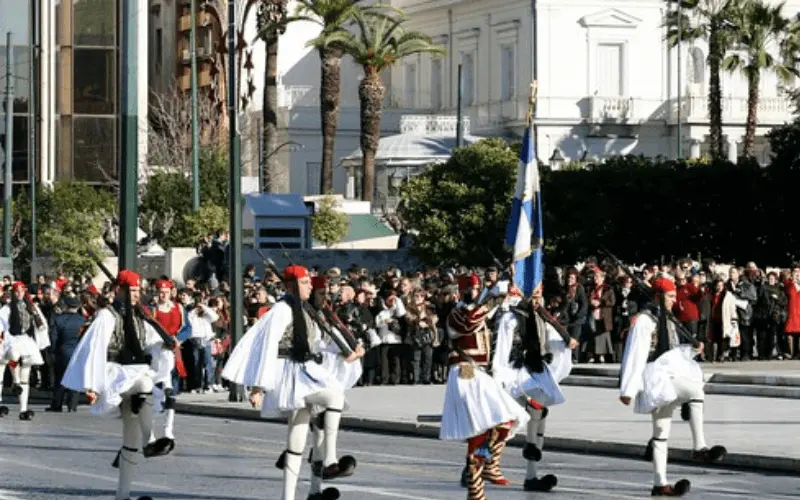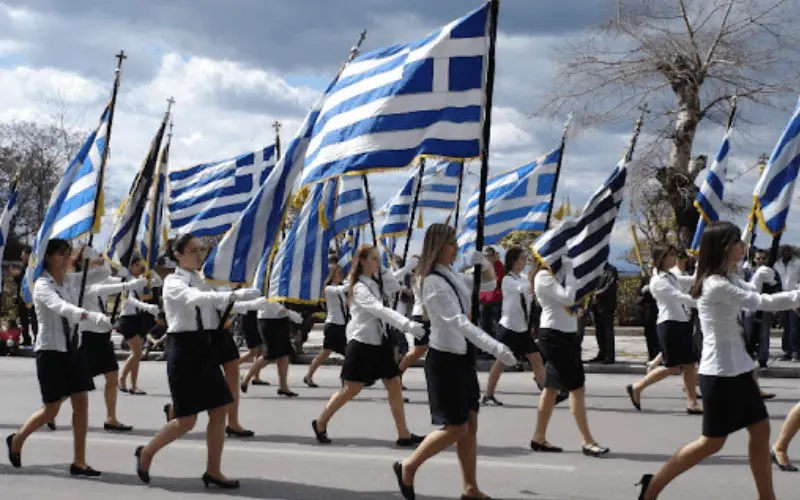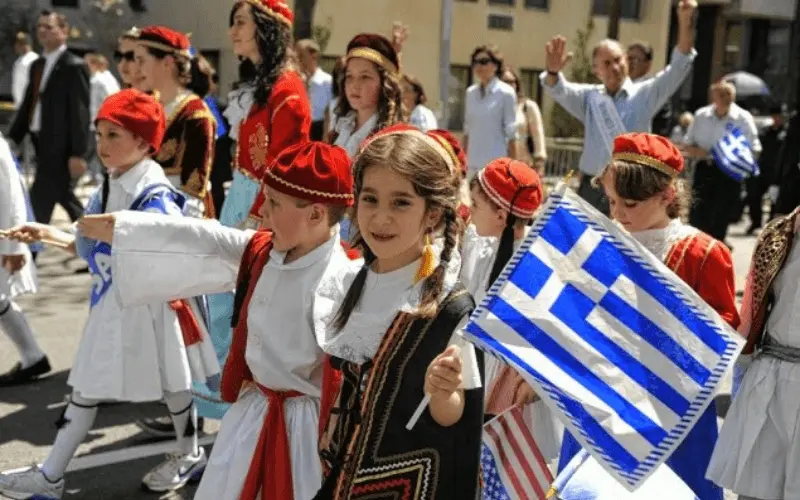Greek Independence Day
Greek Independence Day, also known as Greek Independence, is a special occasion that marks the country’s remarkable journey to freedom. Every year, Greeks celebrate this day with pride, reflecting on their history and the unwavering spirit that led them to independence. It’s a time to honor the resilience and unity that define Greece, where the love for freedom echoes in the hearts of its people.
Stay tuned to learn about its history and how Greeks celebrate their independence.
Greek Independence Day History

The Prelude to Revolution: The stage for the Greek Independence movement was set in motion in 1821, culminating in a historic turning point known as the 1821 Revolution. As tensions brewed between the Greek population and Ottoman rule, a pivotal moment unfolded on March 25, 1821, when Bishop Germanos of Patras raised the banner of revolution over the Monastery of Agia Lavra in the Peloponnese.
The Spark That Ignited Change: This symbolic act catalyzed a widespread uprising, symbolizing the indomitable spirit of a people yearning for freedom. The 1821 Revolution, synonymous with The Greek Revolution, resonated across the nation, marking a determined effort to break free from the shackles of Ottoman dominance.
Strongs Greek 26 and the Road to Independence: The Strongs Greek 26, embedded in the ethos of this historic struggle, encapsulates the collective strength and resilience of the Greek people. The events of 1821 stand as a testament to the unwavering commitment to reclaiming independence, shaping the course of Greek history, and solidifying March 25th as a day of significance for generations to come.
How Many Years Was Greece Not Independent?

For nearly a decade, Greece grappled with its fight for freedom. This pivotal chapter in Greek history, aptly named the Greek Independence Year, marked a period of intense struggle. Against the backdrop of Ottoman rule, the Greek people tenaciously pursued autonomy.
Their unwavering determination bore fruit in 1821 when they boldly declared their independence. Those nine years leading up to this momentous proclamation stand as a testament to the resilience and spirit of the Greek nation a beacon of hope and perseverance in their quest for liberty.
When Did Greece Gain Independence from the Ottoman Empire?

In the year 1832, Greece achieved a monumental milestone their hard-fought battle for independence culminated in victory. This protracted struggle, aptly named the Greek War of Independence, had tested the nation’s resolve to its limits.
On March 25th, a date etched deeply into Greek history, the pivotal declaration resounded: Greece was now free from Ottoman rule. The nation stood tall, asserting its sovereignty and solidifying this moment as a symbol of liberty. March 25th became forever synonymous with the commencement of Greece’s Independence Year.
What Caused the Greek War of Independence?

The Greek War of Independence was fueled by the fervor for revolutionary nationalism in Europe. The desire for self-determination and independence stirred the hearts of the Greek people, leading to a profound and courageous struggle. This fight for freedom, encapsulated in the Greek War of Independence, emerged as a response to the call for autonomy, marking a pivotal moment in Greece’s journey towards independence.
When Greece’s Independence Day is celebrated?

Greek Independence Day is celebrated annually on March 25th. In the year 2024, the commemoration falls on Monday, March 25. This date holds immense significance, not only as Greece’s Independence Day but also as a day marked by various important events. Additionally, March 25th historically aligns with Old New Year’s Day, further enhancing the richness of this celebration in the Greek calendar.
What does Greece’s flag represent?

The flag of Greece carries symbolic significance, where the blue color represents the vast sky and seas that surround the nation. Paired with white, which symbolizes the purity of the Greek independence struggle, the flag encapsulates the essence of the country’s history and its unwavering commitment to freedom. Together, these elements create a powerful representation of Greece’s journey towards autonomy and the resilience of its people.
How is Greek Independence Day Celebrated?
Greek Independence Day is celebrated in the following way:
1. Parades Across the Nation

The heart of Greek Independence Day beats vibrantly through the school flag parades held in towns and villages nationwide. This cherished tradition sees schoolchildren donning traditional Greek costumes, marching proudly, and carrying Greek flags, creating a colorful spectacle that symbolizes the unity and pride of the Greek people.
2. Traditional Attire and National Pride

on Greek Independence Day as part of the celebrations, the streets come alive with the sights and sounds of Greek culture. The traditional attire worn by the participants not only reflects the nation’s rich history but also serves as a testament to the enduring spirit of the Greek independence struggle. The parade becomes a visual ode to national identity, emphasizing the importance of cultural heritage.
3. In Athens and Beyond

In the capital city of Athens, the celebrations of Greek Independence Day take on a grand scale with National Day events attracting locals and visitors alike. The festivities may include the Independence March, where crowds gather to witness a display of national pride. The day becomes a living tribute to those who died fighting for Greek Independence, fostering a sense of remembrance and gratitude.
3. Artistic Expressions of Independence

Greek Independence Day is not only marked by physical demonstrations of pride but also by artistic expressions. From poems that reflect the struggles and triumphs of the past to movies dedicated to the significance of the day, various creative avenues serve as means of honoring and celebrating Greek Independence Day.
4. Connecting Ancient Traditions with Modern Celebrations

As the day unfolds, the celebrations may draw inspiration from Ancient Greece’s May Day traditions, creating a bridge between the past and the present. The festivities blend modern expressions of patriotism with echoes of ancient rituals, further enriching the cultural tapestry of Greek Independence Day.
5. Honoring the Sacrifice

The day is not only about celebration but also about paying homage to the sacrifices made for independence. The phrase “Happy Anniversary in Greek” takes on a deeper meaning, acknowledging the resilience of the Greek people and the significance of the journey towards freedom.
Read other National Independence Day Guides by daysdiscuss
Frequently Asked Questions
When did Greece gain independence?
Greece gained independence on March 25, 1821. This historic date marks the commencement of the Greek War of Independence, a pivotal moment in the nation’s history when the Greek people boldly declared their quest for autonomy, leading to the eventual triumph over Ottoman rule. March 25th stands as a symbolic day of freedom, symbolizing the birth of the modern Greek state.
Why is Greek Independence Day on March 25?
Greek Independence Day is celebrated on March 25th, marking the commencement of the Greek people’s successful struggle against the Ottoman Empire. This significant date signifies the beginning of the Greek War of Independence in 1821 when the people of Greece united to assert their autonomy and ultimately triumphed over oppressive rule. March 25th serves as a poignant reminder of the nation’s resilience and determination, making it a symbolic day in the history of modern Greece.
What does Greece celebrate on the 28th of October?
On the 28th of October, Greece celebrates the anniversary of the Greek revolt. This significant date commemorates the historic moment in 1940 when Greece boldly rejected the Italian ultimatum during World War II. The refusal to surrender marked the commencement of the Greek resistance against Axis powers. October 28th, known as Oxi Day, is a day of national pride and remembrance, honoring the courage and resilience of the Greek people in the face of adversity.
How long did Turkey rule Greece?
Turkey ruled Greece for nine years. This period, marked by Ottoman rule, came to an end with the commencement of the Greek War of Independence in 1821. The struggle for autonomy ultimately led to Greece gaining independence from Turkish rule.
How Long Were the Greeks Under the Turks?
The Greeks were under the rule of the Turks for nearly 400 years. This period of Ottoman domination lasted until the Greek War of Independence began in 1821, marking the end of a prolonged era of Turkish rule and the commencement of Greece’s quest for autonomy.
When did Greece gain independence from the Ottoman Empire?
Greece gained independence from the Ottoman Empire in the year 1832. The conclusion of the Greek War of Independence resulted in the establishment of an independent Greek state, marking the end of Ottoman rule over Greece.







